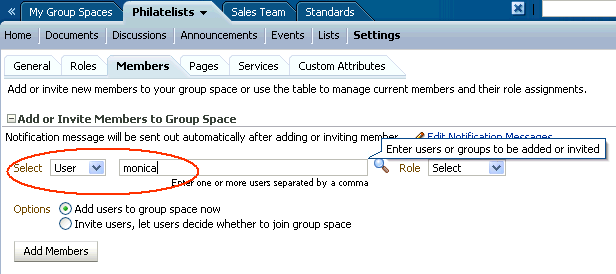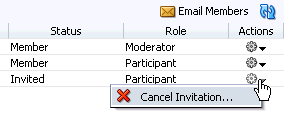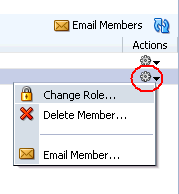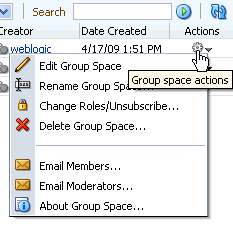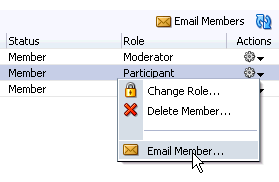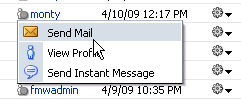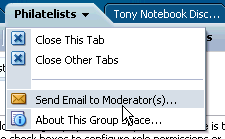12 Managing Group Space Members and Roles
This chapter provides information about managing group space members and roles. It contains the following sections:
This chapter is intended for users who are responsible for managing group space members and their role assignments. It describes how to set up a group space membership policy and define member roles and responsibilities.
This chapter is intended for users assigned, minimally, the group space Moderator role or a custom role that includes the default permissions granted to a moderator.
The WebCenter Spaces administrator has the authority to expose or hide some group space features and services. This means that you must contact your WebCenter Spaces administrator if you find that some of the tasks discussed in this chapter are not be available to you.
Note:
For more information about group space roles, see Section 12.2.1, "What You Should Know About Group Space Roles and Permissions".12.1 Setting Up the Group Space Membership Policy
Group space moderators determine the membership policy for their group space, choosing between an "invitation only" membership policy, allowing WebCenter users to join themselves by subscribing to (and unsubscribing from) the group space, adding new members directly, or using any combination of these membership options.
Enabling self-subscription does not necessarily mean that users automatically gain access to a group space. Moderators can still control who joins (or leaves) the group space through an approval process.
Default membership permissions are derived from the template used to create the group space. Group space moderators can change these settings at any time. This section describes:
-
Managing Self-Subscription and Membership Changes for a Group Space
-
Managing Approval Requirements for Group Space Unsubscription
12.1.1 Managing Self-Subscription and Membership Changes for a Group Space
As a group space moderator, you may want to limit access to a group space, or allow WebCenter users to self-subscribe to a group space without an invitation.
Additionally, you may allow WebCenter users to join a group space or change their group space membership without approval, or require approval for certain roles. When membership requests require approval, new members do not automatically gain access when they subscribe to a group space. Instead, the moderator receives a subscription notification to either accept or reject.
To manage self-subscription and membership changes for a group space:
-
Click the Settings tab, then the General tab.
-
On the General page, under Self-Subscription / Change Membership:
-
To disallow non-members from subscribing to the group space and members requesting changes to their current membership, select Do Not Allow Self-Subscription and Change Membership (Figure 12-1).
-
To allow non-members to subscribe to the group space and members to request changes to their current membership, select Make All Roles Available on Self-Subscription and Change Membership.
Note:
If you select this option, ensure that Discoverable is also selected if you want to make the group space known to people through searches and on their Group Spaces page (see Section 10.11.1, "Making a Group Space Known (Discoverable)").When you select this option, the following additional options become available for the group space on the Group Spaces page in My Group Spaces:
-
Group spaces that allow self-subscription display a Join Space button in the Group Space Information dialog box (click the Actions icon for the group space, then select About Group Space, as described in Section 9.3, "Subscribing to a Group Space").
-
Click the Actions icon for the group space, then select Change Roles/Unsubscribe.
-
-
-
To be notified of self-subscription requests to approve them before users become members of the group space, select Moderator Approval Required.
-
To specify which roles users see on the Self-Subscription page and the Change Membership page, select Select Roles Available on Self-Subscription and Change Membership to display a table showing all the roles available (Figure 12-2).
-
Select Enable to offer the role on the Self-Subscription or Change Membership pages. Clear Enable to hide a role.
-
Select Approval Required to specify that moderator approval is required before the request is granted. The request is sent to the moderator's Worklist to approve or reject (if the group space has multiple moderators, all moderators receive the request; only one moderator needs to process the request). Clear Approval Required to allow the change without moderator approval.
-
-
Click Apply to save.
New members can now subscribe to this group space. For more information, see Section 9.3, "Subscribing to a Group Space".
12.1.2 Managing Approval Requirements for Group Space Unsubscription
If moderator approval is required to unsubscribe from a group space, an unsubscription request is sent to the moderator's Worklist when a member unsubscribes to either accept or reject.
To configure approval options for group space unsubscription:
-
Click the Settings tab, then the General tab.
-
On the General page, under Self-Subscription / Change Membership (Figure 12-3):
-
To specify that moderator approval is required before unsubscription requests are granted, select Require Moderator Approval to Unsubscribe.
-
To allow unsubscription without approval, clear Require Moderator Approval to Unsubscribe.
Figure 12-3 Specifying Unsubscribe Request Approval Requirements

Description of "Figure 12-3 Specifying Unsubscribe Request Approval Requirements"
-
-
Click Apply to save.
12.2 Managing Group Space Roles and Permissions
The group space moderator is responsible for setting up roles to control what members can do in the group space. Group space moderators can manage permission assignments for existing group space roles, create new group space roles, and delete roles that are no longer required.
This section describes how group space moderators manage roles and permissions of group space members:
12.2.1 What You Should Know About Group Space Roles and Permissions
When a group space moderator creates a new group space, WebCenter Spaces automatically creates defaults roles, each assigned default permissions. If the default roles do not meet the needs of the group space, the group space moderator can define custom roles. This section provides the following information:
12.2.1.1 Understanding the Default Group Space Roles
WebCenter Spaces automatically creates several default roles for a new group space, as shown in Table 12-1.
Note:
These default roles are always available for group spaces based on out-of-the-box templates (Blank, Group Project, and Community of Interest). Group spaces based on user-defined templates may offer a different set of default roles. The default permissions assigned to the default roles are shown in Table 12-2.Table 12-1 Default Roles for Group Spaces
| Group Space Role | Description | Modify Permissions | Delete Role |
|---|---|---|---|
|
|
The |
Yes (except for |
No |
|
|
The |
Yes |
Yes |
|
|
Any user with access to Oracle WebCenter Spaces who is not logged in assumes the Note: While it is possible to grant the |
Yes |
No |
|
|
The The |
Yes |
No |
|
|
The |
Yes |
Yes |
12.2.1.2 Understanding Group Space Permissions
Group space members can perform actions in the group space as specified by the permissions assigned to their role. Table 12-2 lists the default permissions associated with a group space, group space pages, and group space services.
Note:
TheManage permission inherits the privileges of all "lesser" permissions. Besides Manage, no permission inherits the privileges of any other permission. Therefore, be careful to assign the appropriate set of permissions to allow users to perform required actions. For example, whenever you assign the Create permission, select the View permission too.Table 12-2 Group Space Permissions
| Group Space Element | Permissions | Roles Granted Permission By Default |
|---|---|---|
|
Group Space |
Manage - Manage group space membership, assign permissions and roles, create group space content, manage service availability, and perform delete operations. Includes |
|
|
Configure - Contribute to the group space; for example, add content, post discussion forum topics, add list rows, upload documents. Set general and service-related properties for the group space. Users with the |
||
|
View - View the content of the group space. |
|
|
|
Pages |
Manage - Manage page access and edit page title. Includes |
|
|
Delete - Delete pages. Users with the |
||
|
Edit - Edit page properties and page content (except for title). Users with the |
||
|
Personalize - Edit page content for your personalized view of pages. Users with the |
||
|
View - View pages. |
|
|
|
Create - Create new pages. Users with the |
||
|
Announcements |
Manage - Perform any operation on announcements associated with the group space. Includes Note: While it is possible to grant the |
|
|
Edit - Edit announcements. Users with the |
|
|
|
View - View announcements. |
|
|
|
Discussions |
Manage - Perform any operation on the discussion forum category associated with the group space. Includes Note: While it is possible to grant the |
|
|
Edit - Post topics, and reply to topics. Users with the |
|
|
|
View - View discussions. |
|
|
|
Documents |
Manage - Perform any operation on files and folders associated with the group space. Includes |
|
|
Delete - Delete files and folders associated with the group space. Users with the |
|
|
|
View - Browse through files and folders. |
|
|
|
Create - Create and update files and folders. Users with the |
|
|
|
Group Space Events |
Manage - Perform any operation on events associated with the group space. Includes |
|
|
Delete - Delete events. Users with the |
|
|
|
Edit - Edit event details. Users with the |
|
|
|
View - Read events. |
|
|
|
Create - Create new events. Users with the |
|
|
|
Links |
Manage - Create and delete links between objects, and manage links permissions. Includes |
|
|
Delete - Delete links between two objects. Users with the |
|
|
|
Create - Create links between objects. Note: any user with |
|
|
|
Lists |
Manage - Perform any operation on lists, and manage list permissions. Includes |
|
|
Delete - Delete lists. Users with the |
|
|
|
Edit - Edit list definitions. Users with the |
|
|
|
Edit Data - Add, edit, and delete list rows. Users with the |
|
|
|
View - View lists and their data. |
|
|
|
Create - Create new lists. Users with the |
|
|
|
Notes |
Manage - Perform any operation on notes. Includes |
|
|
Delete - Delete notes. Users with the |
|
|
|
Edit - Edit notes. Users with the |
|
|
|
View - Read notes. |
|
|
|
Create - Create notes. Users with the |
|
12.2.1.3 Understanding Custom Group Space Roles
If the default roles do not serve group space requirements, the group space moderator can define custom roles that better suit its members. See Section 12.2.2, "Defining Custom Group Space Roles".
Alternatively, group space moderators can modify the permissions assigned to the default roles. See Section 12.2.3, "Viewing and Editing Permissions of a Group Space Role".
12.2.2 Defining Custom Group Space Roles
If the default roles provided by WebCenter Spaces do not meet the needs of the group space, you can define custom roles to better suit the requirements of the group space members.
To create a group space role:
-
Click the Settings tab, then the Roles tab.
On the Roles page, current roles defined for this group space display as columns in the table.
-
To define a new role for this group space, click Create Role.
The Create Role dialog box opens (Figure 12-4).
Figure 12-4 Creating a New Group Space Role
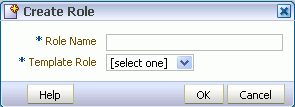
Description of "Figure 12-4 Creating a New Group Space Role"
-
Enter a suitable Role Name. Names can contain only alphanumeric characters and underscores. Ensure that role names are self-descriptive to make it as obvious as possible which group space member should belong to which roles.
-
Optionally, choose a Template Role.
The new role inherits permissions from the template role. You can modify these permissions in the next step. If you do not choose a template role, the new role is created with no permissions.
Choose Moderator to create a role that inherits full administrative group space privileges. Choose Viewer (if available) to create a role starting with minimal, view-only privileges.
-
Click OK.
The new role appears as a column in the table on the Roles page. The permissions list shows which actions users with this role can perform.
-
To modify permissions for the role, select or clear each permission check box.
Take care to assign appropriate access rights when assigning permissions for new roles. Do not allow users to perform more actions than are necessary for the role but at the same time, try not to inadvertently restrict them from activities they must perform.
-
Click Apply to save the custom role.
12.2.3 Viewing and Editing Permissions of a Group Space Role
The Roles page lists permissions available for the group space, the group space pages, and services that have been enabled for the group space. If a service is not shown, then either no permissions are required for that service (for example, the Mail service), or the service is disabled in the group space. For more information, see Section 11.3.1, "Enabling and Disabling Services Available to a Group Space".
If the default permissions assigned by WebCenter Spaces do not meet the needs of the group space, or you want to change previously assigned group space permissions, you can modify the permissions to better suit the requirements of the group space roles.
Note:
TheModerator role permissions for the group space (Manage, Configure, View) cannot be modified.To change the permissions assigned to a group space role:
-
Click the Settings tab, then the Roles tab.
-
On the Roles page, select or clear the check boxes to enable or disable permissions for a role (Figure 12-5).
Figure 12-5 Modifying Group Space Permissions
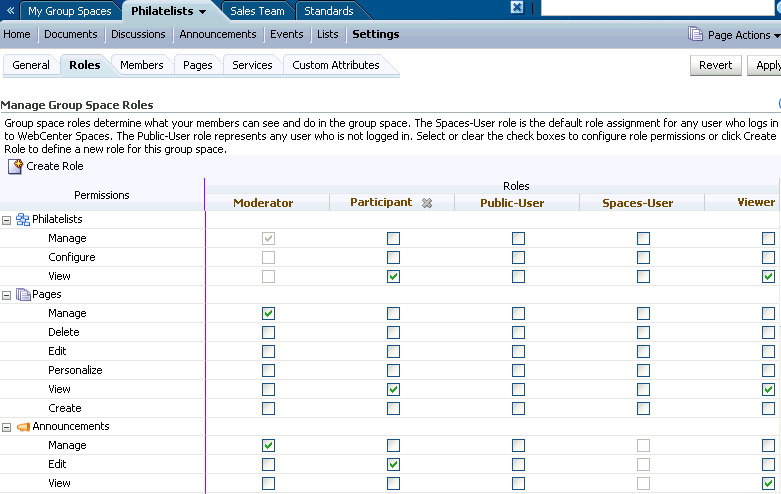
Description of "Figure 12-5 Modifying Group Space Permissions"
-
Click Apply to save.
New permissions are effective immediately.
Note:
For more detailed information about granting access permissions to a group space, and to individual group space pages, refer to Section 10.11.2, "Granting WebCenter Spaces Users Access to a Group Space".12.2.4 Deleting a Group Space Role
When a group space role is no longer required, the group space moderator can remove it from the group space. This helps maintain a valid role list and prevents inappropriate role assignment.
To delete a group space role:
-
Click the Settings tab, then the Roles tab.
-
On the Roles page, click the Delete icon next to the role you want to delete (Figure 12-6).
-
In the Delete Role confirmation dialog box, click Delete to confirm that you want to delete the role.
12.3 Managing Members and Assigning Roles
This section describes how group space moderators manage group space membership. It includes the following subsections:
12.3.1 What You Should Know About Group Space Membership
Member participation is central to any group space. It is the group space moderator's responsibility to manage group space membership and determine member participation through the permissions assigned to the various roles defined for the group space. A group space can gather members in several ways:
-
If a group space is marked as discoverable (see Section 10.11.1, "Making a Group Space Known (Discoverable)"), it can be made known to anyone logged in to WebCenter Spaces through searches and on the Group Spaces page in My Group Spaces.
-
If a group space is made public (see Section 10.11.3.1, "Making a Group Space Public"), it is available to anyone with access to the WebCenter Spaces instance that contains the group space if the
Public-Userrole has been granted the appropriate permissions. -
A group space moderator can add or invite individual members or groups at the time a group space is created, or later (see Section 12.3.4, "Adding Members to a Group Space").
12.3.2 Viewing Group Space Members
To review current membership for a group space:
-
Click the Settings tab, then the Members tab.
-
On the Members page, review the current list of members together with their current role assignment.
12.3.3 Composing Messages to New Members
When you add or invite someone to your group space, they receive a message through the Mail service (if configured) and through their Worklist (if Worklists are set up). Before you start recruiting new members, take some time to compose suitable greetings and messages for the following scenarios:
-
Adding a WebCenter Spaces user as a member of your group space.
-
Inviting a WebCenter Spaces user to join your group space.
-
Inviting someone to register with WebCenter Spaces and join your group space.
To compose messages sent out to new members:
-
Click the Settings tab, then the Members tab.
-
On the Members page, click Edit Notification Messages (Figure 12-7).
Figure 12-7 Editing Messages to New Members
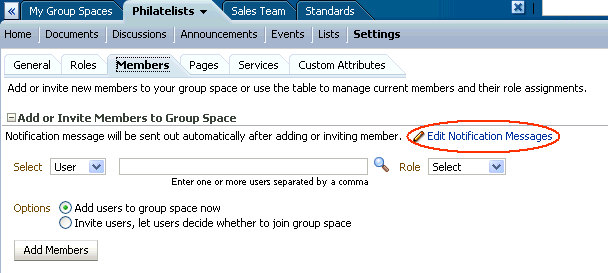
Description of "Figure 12-7 Editing Messages to New Members"
-
Enter a short message to include in group space membership notifications or invitations in the appropriate sections, as required (Figure 12-8). Use the message text to describe the group space and how it might be of use to new members.
Figure 12-8 Composing Messages to New Members
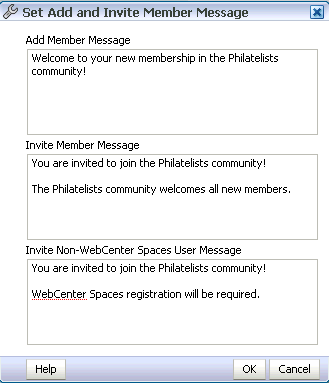
Description of "Figure 12-8 Composing Messages to New Members"
-
Click OK to save.
12.3.4 Adding Members to a Group Space
This section describes various ways that a group space moderator can enlist group space members:
12.3.4.1 Adding or Inviting a WebCenter Spaces User
As a group space moderator, you can add or invite registered WebCenter Spaces users to become members of your group space. WebCenter Spaces users receive notification through the Mail service (if configured) and through their Worklist (if Worklists are set up).
To add or invite a member to your group space:
-
Click the Settings tab, then the Members tab.
-
On the Members page, click Edit Notification Messages to edit the greeting messages sent to all new added and invited members (see Section 12.3.3, "Composing Messages to New Members").
-
Under Add or Invite Members to Group Space, from the Select list:
-
Select User to add or invite one or more individual users to the group space.
-
Select Group to add or invite multiple users belonging to a named user group in the identity store.
-
-
Enter one or more user or group names in the entry field, separated by commas (Figure 12-9).
-
If you are not sure of a user or group name, click the Find icon to search the WebCenter Spaces identity store (see "Configuring the Identity Store" in Oracle Fusion Middleware Administrator's Guide for Oracle WebCenter). In the Find User or Find Group dialog box, enter—minimally—two consecutive characters of the name for which you are searching. Click the Search icon, and all names matching your search criteria appear in the results area. Select one or more user names from the list, and click OK.
Notes:
-
Specifying a group name adds all users currently in the group. Note that any subsequent changes or updates to the group are not automatically reflected in the group space.
-
Adding a
Public-Userto a group space does not make the group space available to the public. To find out how to make a group space public, see Section 10.11.3.1, "Making a Group Space Public".
-
-
Select a Role for the new (or invited) group space members. If the role you want is not listed, create a role that meets your requirements (see Section 12.2.2, "Defining Custom Group Space Roles").
-
Select the method for adding the specified users to the group space:
-
Add users to group space now to add new users immediately and automatically to the group space.
-
Invite users, let users decide whether to join group space to send new users an invitation to join the group space.
Membership notifications and invitations are sent through the Mail service (if configured) and display in the users' Worklist (if Worklists are set up), with the message you have composed in the Set Add and Invite Member Message dialog box (see Section 12.3.3, "Composing Messages to New Members"). The notification or invitation includes a link to the group space.
-
-
Click Add Members or Invite Members, depending on the selection in Step 7.
-
To cancel an invitation to prospective members with Invited status, click the Actions icon, and select Cancel Invitation (Figure 12-10).
12.3.4.2 Allowing a WebCenter Spaces User to Self-Subscribe
Self-subscription allows a WebCenter Spaces user to request group space membership without an invitation from the group space moderator. Certain types of group spaces, especially interest-based communities, are particularly suited to this form of member enrollment as the group space often reaches a wider audience.
The capabilities of self-subscribed members depends on which group space roles you decide to offer on the Self-Subscription page. For more information, see Section 12.1.1, "Managing Self-Subscription and Membership Changes for a Group Space".
12.3.4.3 Inviting a Non-WebCenter Spaces User
If your WebCenter Spaces application allows unregistered people to become group space members, a group space moderator can invite anyone with a valid mail address to join the group space. Prospective members receive an invitation by mail, inviting them to join the group space. Upon accepting the invitation, unregistered users are prompted to register with WebCenter Spaces before gaining access to the group space.
To invite someone outside the WebCenter Spaces community to join your group space:
-
Click the Settings tab, then the Members tab.
-
On the Members page, click Edit Notification Messages to edit the greeting message that is sent to non-WebCenter Spaces users (see Section 12.3.3, "Composing Messages to New Members").
-
Under Invite Non-WebCenter Spaces Users:
Note:
The Invite Non-WebCenter Spaces Users section displays only when both of the following are checked on the WebCenter Spaces Administration General page, under Self-Registration:-
Allow Self-Registration Through Invitations
-
Allow Public Users to Self-Register
-
Enter the Email Address(es) for one or more prospective group space members, separated by commas.
-
Select a Role for the prospective members. If the role you want is not listed, create a role that meets your requirements (see Section 12.2.2, "Defining Custom Group Space Roles").
-
Click Invite.
The prospective members will receive an mail invitation to join the group space with the message you have composed in the Invite Non-WebCenter Spaces User Message section of the Set Add and Invite Member Message dialog box (see Section 12.3.3, "Composing Messages to New Members"). The invitation includes a secure, self-registration URL that the invited party can click to register with WebCenter Spaces and accept group space membership (see Section 9.3.2, "Subscribing to a Group Space (Unregistered WebCenter Spaces User)".
-
12.3.5 Changing Member Role Assignments
Moderators can change a member's role at any time. Users are notified of membership changes through their Worklist.
To change a member's current role:
-
Click the Settings tab, then the Members tab.
-
On the Members page, click the Actions icon for the appropriate member, and select Change Role (Figure 12-11).
-
In the Change Role dialog box, choose a role from the Change Role To list, which includes all the roles shown on the Roles page, except
Public-UserandSpaces-User.If you are not sure which role to choose, click the Roles tab to determine the range of actions that current roles allow (see Section 12.2.3, "Viewing and Editing Permissions of a Group Space Role"). If the existing roles do not meet your requirements, consider creating a new role (see Section 12.2.2, "Defining Custom Group Space Roles").
-
Click OK.
12.3.6 Approving Requests for Group Space Membership
If someone requests membership of your group space or an existing member requests a new role, a notification appears in your Worklist. As group space moderator, you can approve or reject these requests.
The person making the request will receive notification of your decision. If you reject a request, you should explain the reasons why.
For details, see Chapter 30, "Working with the Worklist Service".
12.3.7 Communicating with Moderators and Members of a Group Space
You can send messages to individual group space members, as well as to the moderator(s) or all the members of a group space. WebCenter creates a default distribution list for every group space if the Mail Server is Microsoft Exchange and active directory connection details (LDAP) are provided in the mail server connection settings. As members leave or join the group space, WebCenter updates the default distribution list.
For information about setting up a custom group space mail distribution list, see Section 11.3.2, "Configuring a Custom Group Space Mail Distribution List".
There are several ways to communicate with the moderator(s) and members of a group space:
-
(Group space moderators/members only) Sending a Message from the Group Spaces Page
-
(Group space moderators only) Sending a Message from the Members Page
-
(Group space moderators/members and non-members) Contacting the Group Space Moderator(s)
12.3.7.1 Sending a Message from the Group Spaces Page
(Group space members only) To send a message to the group space moderator(s) or all group space members from the Group Spaces page:
-
From the Group Spaces menu at the top of the application, select My Group Spaces.
-
On the Group Spaces page, find the group space to which you want to send mail. If it is not shown, use Filter or Search to list it (see Section 9.2, "Viewing Available Group Spaces").
-
Under Actions, click the Group Space Actions icon (Figure 12-12) for a selected group space, then select Email Members or Email Moderators. These options are available only to group space members:
12.3.7.2 Sending a Message from the Members Page
(Group space moderators only) To send a message to all group space members, or an individual group space member, from the Members page:
-
Click the Settings tab, then the Members tab.
-
On the Members page, under Manage Group Space Members:
-
To send a message to all members of the group space, click Email Members.
-
To send a message to an individual member of the group space, select the member in the list, then click the Actions icon and select Email Member (Figure 12-13).
-
12.3.7.3 Contacting the Group Space Moderator(s)
Even if you are not a group space member, you can contact the group space moderator(s) in the following ways:
12.3.7.3.1 Contacting Moderator(s) from the Group Spaces Page
(Group space members and non-members) To contact the group space moderator(s) from the Group Spaces page:
-
From the Group Spaces menu at the top of the application, select My Group Spaces.
-
On the Group Spaces page, find the group space to which you want to send mail. If it is not shown, use Filter or Search to list it (see Section 9.2, "Viewing Available Group Spaces").
-
Under Creator, click the moderator's name for a selected group space to display a range of contact options (Figure 12-14), and select your preferred option.
12.3.7.3.2 Contacting Moderators from the Actions Menu
(Group space members and non-members) To send a message to the group space moderator(s) from the group space tab's actions menu:
-
On the group space tab, click the down arrow icon to display the actions menu, and select Send Email to Moderator(s) (Figure 12-15).
12.3.8 Revoking Group Space Membership
A group space moderator can revoke user membership at any time. Users receive notification through their Worklist when you cancel their membership.
To revoke group space membership:
-
Click the Settings tab, then the Members tab.
-
On the Members page, click the Actions icon for the member you want to remove, and select Delete Member. (Figure 12-16).
Figure 12-16 Removing a Group Space Member
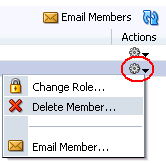
Description of "Figure 12-16 Removing a Group Space Member"



